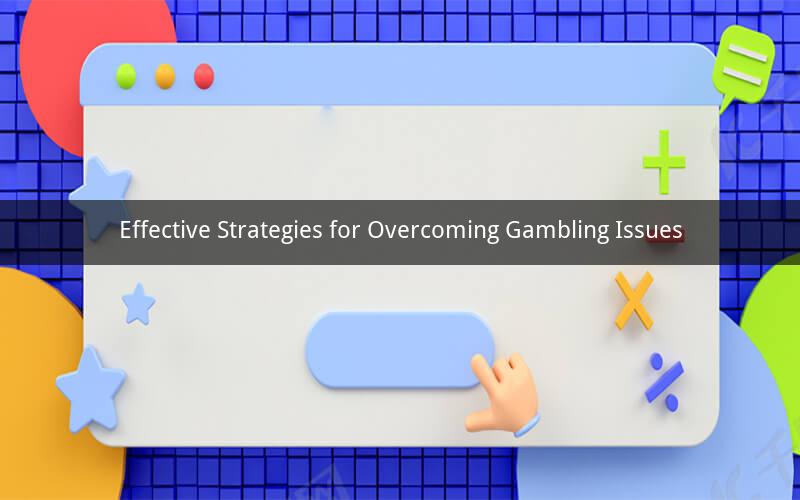
Gambling problems can be challenging to overcome, but with the right strategies and support, individuals can regain control of their lives. This article explores various methods for controlling gambling problems and provides insights into the importance of seeking professional help. By understanding the causes and consequences of gambling addiction, individuals can take the necessary steps to regain control and lead a healthier, more balanced life.
1. Identify the Signs of a Gambling Problem
Recognizing the signs of a gambling problem is the first step in overcoming it. Some common signs include:
- Feeling the need to gamble more and more to achieve the same level of excitement
- Using gambling as a way to escape problems or emotions
- Lying to friends and family about gambling activities
- Borrowing money to fund gambling habits
- Neglecting responsibilities due to gambling
2. Establish a Budget and Set Limits
One effective strategy for controlling gambling problems is to establish a budget and set limits. This helps individuals stay within their means and avoid spending more money than they can afford. Here are some tips for setting limits:
- Decide on a maximum amount of money to spend on gambling activities each week or month.
- Use cash instead of credit cards to avoid overspending.
- Set time limits for gambling sessions to prevent prolonged periods of play.
3. Find Alternatives to Gambling
Finding healthy alternatives to gambling can help reduce the urge to gamble. Some activities to consider include:
- Exercise: Physical activity can release endorphins, which can improve mood and reduce stress.
- Hobbies: Engaging in a hobby can provide a sense of accomplishment and distract from the desire to gamble.
- Socializing: Spending time with friends and family can provide emotional support and reduce the need for gambling as a coping mechanism.
- Volunteering: Helping others can provide a sense of purpose and improve mental health.
4. Seek Professional Help
If gambling problems persist, seeking professional help is crucial. Therapy can provide individuals with the tools and support needed to overcome their addiction. Some types of therapy that can be effective include:
- Cognitive-behavioral therapy (CBT): This type of therapy helps individuals identify and change negative thought patterns related to gambling.
- Family therapy: Family therapy can help address the impact of gambling on loved ones and improve communication.
- Support groups: Joining a support group can provide a sense of community and encouragement from others who are struggling with similar issues.
5. Create a Support System
Creating a support system is essential for overcoming gambling problems. This may include:
- Informing friends and family about the gambling problem to seek their support.
- Joining a gambling support group to connect with others who understand the challenges of addiction.
- Working with a mentor or sponsor who can provide guidance and accountability.
Frequently Asked Questions:
1. What are the long-term consequences of not addressing gambling problems?
Answer: Long-term consequences of not addressing gambling problems can include financial ruin, damaged relationships, legal problems, and mental health issues such as depression and anxiety.
2. Can gambling addiction be cured?
Answer: While there is no cure for gambling addiction, it is possible to overcome the addiction with the right treatment and support.
3. How can I tell if my gambling has become a problem?
Answer: If you find yourself lying about your gambling activities, neglecting responsibilities, or using gambling as a way to cope with stress, it may be time to seek help.
4. Can therapy help me overcome my gambling addiction?
Answer: Yes, therapy can be highly effective in helping individuals overcome gambling addiction. A therapist can provide personalized strategies and support tailored to your needs.
5. What should I do if I suspect a loved one has a gambling problem?
Answer: If you suspect a loved one has a gambling problem, it's important to approach the situation with empathy and support. Encourage them to seek help from a professional and offer to go with them to therapy or support group meetings.